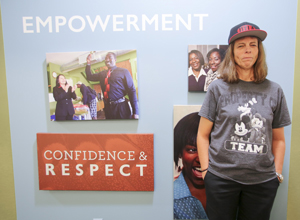After a five-year, $10 million renovation, Clifton’s Cafeteria in downtown Los Angeles has already become one of the hottest area restaurants after its reopening earlier this month.
The redone 1935 classic offers guests five stories of food and drink options, a tiki bar, a giant fake redwood tree bursting through the dining room – and a handful of employees who either used to – or still do – live on the streets.
One batch of unlikely employees has come aboard through the cafeteria’s partnership with downtown nonprofit Chrysalis.
Clifton’s has a history of lending a helping hand – its founder, Clifford Clinton, opened his first cafeteria in 1931 with a “pay what you wish” policy, which made it hugely popular during the Depression. Real estate developer Andrew Meieran bought the South Broadway location, formerly known as Clifton’s Brookdale, in 2010 and has carried on those values.
“The Clintons had such a rich tradition of giving back to the community,” said Barbara Jacobs, Meieran’s partner and the chief operating officer of downtown’s Edison, which owns and operates Clifton’s. “By getting a job, many of them see their kids for the first time in a long time. That job is the step that pushes the door open again to our basic humanity.”
New environment
Twenty-two-year-old John Dillon founded Chrysalis in 1982 as a food and clothing distribution center on Skid Row. It eventually evolved into an organization dedicated to preparing homeless people for employment, which remains its core mission today.
Chrysalis Chief Executive Mark Loranger said that while the organization does teach job-related skills, its program begins with the basics of simply learning how to function in a workplace.
“The biggest chunk of what we do is on soft skills,” he said. “Communication, professionalism, being able to make eye contact and responding to supervision appropriately. A lot of our clients have never experienced that structured environment.”
That basic training has allowed program participants to get jobs like the ones they’ve filled at Clifton’s.
Jacobs, who oversaw staffing at the refurbished restaurant, has been hiring people through other homeless-focused nonprofits such as downtown’s Midnight Mission and Union Rescue Mission for 15 years. That made her a natural partner for Chrysalis.
While Jacobs relishes the ability to give people a chance, she only brings in employees who have shown the commitment required to be in a program like those at Chrysalis, which requires applicants to be clean and sober for at least 30 days.
“We do not hire anyone who does not come from a program,” Jacobs said.
Every single Chrysalis client she interviewed was well-prepared, made eye contact and brought a professional resume, she said Jacobs. But that doesn’t mean everyone made the cut to work in her kitchen.
“They didn’t all seem ready,” she said. ‘Some of them have better skills than others.”
Jacobs said she filtered out those who were ready to work at Clifton’s through interview techniques she’s honed over a decade and a half of hiring people from similar backgrounds.
“I asked them questions like, How long have you been sober? What makes it different this time? There’s nobody that comes to us from a downtown program that this is their first time,” she said.
Despite their backgrounds, the Chrysalis job seekers were held to the same standards as other applicants.
“They took a lot of jobs from other people,” said Jacobs. “We had a job fair and everyone came. They got jobs over other people who were not in programs.”
Mood swing
Angela Ceasar is one of those new hires, beginning her first shift as a Clifton’s dishwasher last week. She spent eight years in jail and came out homeless, without a job to help her get back on her feet.
Ceasar heard about Chrysalis through others in similar situations. Soon, she got a job as a street sweeper at an entity affiliated with the nonprofit. Clifton’s was on her usual cleaning route, and she did everything she could to get a job at the restaurant once it opened.
“It’s how you network,” she said. “It’s how you talk to people and who you meet. I would always clean in front of Clifton’s and people noticed.”
Ceasar also credits the Chrysalis program for improving her interview skills – but more importantly, for helping her believe in herself.
“People like to give up on themselves, but they shouldn’t,” she said.
While Jacobs has been giving second chances for years, Chrysalis’ Loranger said a national shift in conversation regarding crime and punishment has helped his firm place more clients.
“We’re absolutely seeing that,” he said. “There are many employers that previously had the box on their employment application (asking whether the applicant has been convicted of a crime). Many have voluntarily removed that. Many men and women have been in prison for drug offenses that would be misdemeanors today.”
Jacobs acknowledged it’s a riskier hiring strategy than bringing on employees with restaurant experience, but it’s not like the standard interview process is foolproof.
“It doesn’t always work out, but neither do regular employees,” she said. “It only matters what you do from the day you walk through the door, not prior to that. It’s pretty easy to give someone a chance.”
Jacobs said the gratitude of the employees she’s hired off the streets helped her get through the stressful 20-hour days leading up to the grand opening.
“I have goosebumps when I talk about these men and women,” she said. “I walked through Clifton’s the other day, and people were upset that we’re out of turkey. Then someone comes from behind the counter and embraces me and says, ‘I feel so good about myself.’ I mean, that says it all.”

